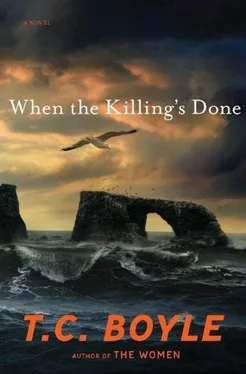She’s unwrapping a sandwich and handing it to her mother — hummus and roasted pepper, on oatnut bread, no meat, though Rita’s an unregenerate carnivore — and she wonders aloud if that’s a good idea. “Shouldn’t we just quit while we’re ahead?”
“Shit, no.” He’s not angry, not disappointed or defensive either. He’s just going to do what he has to do and no one can tell him different. “Don’t you at least want to see what they’re up to? I mean, monitor the situation? If we were really thinking, we would’ve brought Toni Walsh with us.” There’s the sweet suck and wheeze of the engine, the shush of the water parting along the hull. “What do you think, Rita?”
“Me?” She glances up at him, the spark of amusement in her eyes still. “I’m with the program, because this is just, I can’t tell you — amazing. Really amazing.” She shifts her eyes to lean forward and extract a beer from the cooler under the bench. Then she sits up, arches her back as if to relieve the stress of the chase and cracks the beer with a celebratory pop. “I’d love to see the house there,” she says, a seductive note come into her voice. “You know, it was abandoned in our time — until the hunters set up there anyway. Did Anise ever tell you?”
She had, yes. She’d told him about the trauma of all that, the boyfriend — Baxter — half-crippled at the time and powerless to do anything about the slaughter, and the owners exerting pressure on the captains of the hauling barges to ignore Rita’s calls to remove their sheep to market because he wanted them there so the sportsmen could come and put very expensive holes in them, the killing going on even then, but under a different cover. And then the three of them found themselves living in a one-bedroom walkup in Oxnard, right back where they’d started, and instead of six thousand acres to roam they had a backyard the size of a hogpen, and instead of seeing nobody her own age and not knowing the least thing about style or top-forty music or the TV references it took her a year to get, Anise found herself in a classroom. Several classrooms. With a roster of different teachers and a streaming tide of sneering adolescent faces all around her, and if she hadn’t been a born-in-the-flesh beauty and the very incarnation of an adolescent boy’s wet dreams (here he’s extrapolating), she wouldn’t have survived it. Rita got a job as a waitress. The boyfriend — he was an old man by then — mended. Mostly anyway. And he couldn’t find work because there weren’t any sheep ranches to run in Oxnard and his leg bothered him still so it was pitchfork hell to stand up on it for more than ten minutes at a time and he surely wasn’t about to take a minimum-wage job in a hardware store or some such at his age, so he went back to drinking. And so did Rita. They lasted six months, and then he was gone, and Anise, very slowly — watchful, imitative, using her native smarts and the scars of her isolation and her voice and her guitar to her fullest advantage — became Anise.
“No,” he says. “No, she didn’t tell me.”
Playfully, reaching out to give his calf a squeeze, Anise says, “You know I did. About six thousand times?”
“Yeah,” he says. “Okay. But I want to hear it from the source.”
He’s got a sandwich in his hand, and — he checks his watch to see if it’s edged past noon — a beer too. Why not? Why not enjoy himself, have a party if he feels like it? The waters are still free, even if the island’s locked up like a prison cell, only with all the prisoners on the outside.
Rita’s voice is husky with wear, but she recounts the story with a forced gaiety, as if none of it mattered anymore, as if she were over the pain of eviction and the separation from the boyfriend and ultimately her daughter, as if her life of inaction and bar talk in the backwater of Port Townsend were just what she’d always hoped for. He listens in the way of a historian, one hand on the wheel, the other alternately lifting a sandwich and the beer to his mouth, and then Smugglers’ opens up before them at the very moment the Coast Guard boat, lights flashing, some jerk out on the deck, makes the far point and slides across the bay. He can’t believe it. But down goes the sandwich, down goes the beer, and he’s swinging the wheel hard to port as if it’s been programmed in his genes and heading back the way they’ve just come, all innocence, as if they were sightseers skirting the island, boating enthusiasts out for a run on one of the last glorious days of the fall.
Is his heart pounding? You bet. “Talk about high blood pressure,” he says, and tries to laugh. The women are looking back over their shoulders, all the exhilaration blown out of them. “Are they coming after us?” he asks, keeping his voice level.
He won’t look, in the same way he won’t shift his eyes to the rearview when a cop’s behind him on the freeway, on the theory that if you’re too hyper, they’ll nail you. Be respectful, let them know you’re aware of their presence, and keep the speed pinned at sixty-five, no hurry, no fears.
“No,” Anise says, “no, I don’t think so.”
Straight out, easy on the throttle, the blistered back-running slope of San Pedro Point in bright definition out there beyond the bow. He doesn’t say another word. Just watches the point come to them as he changes course ever so slightly, bearing north and east as if he’s heading back to the coast, and that’s just what Anise and her mother are thinking, that they’re done for the day, outmanned, finished, heading home. And then the cove disappears in their wake and the Coast Guard cutter with it — the snitches at Scorpion must not have radioed after all — and when the point is dwindling in their wake he changes course again, bearing west now, retracing the route that brought them here from Scorpion.
Anise and her mother are deep in conversation, every last bump and spike and guano-spattered tumble of rock bringing on a flood of recollection, and they haven’t noticed the change of course — or at least they haven’t mentioned it. But now, when his intention is unmistakable, Rita looks up and says, “Where you heading? Back around again?”
He nods, conscious of Anise’s eyes on him. “I thought we’d just go over and check out Prisoners’ for a bit, on the TNC property. They can’t be everywhere, can they?”
Prisoners’ Harbor, the main port of entry on Santa Cruz, lies on the north shore, just past the narrow eastern neck that gives the island a fanciful look from the air, as if it were a big dun plesiosaur stretching out its blocky head in pursuit of some swift-finned creature of the deep. There’s a long stretch of beach opening out from a tumble of hills and the valley that runs back three miles to the main ranch, where the defunct winery still stands, and where the ranch house, with its pool and gardens and outbuildings, gives the Conservancy a base of operations that feels like a remnant of paradise. He’s been there, twice, in happier times, before the killing started anyway, and the way the ranch house is situated to take in the views of its own private valley in a spot erased from the memory of the world moved something in him. He felt a desperate stab of covetousness, as if after ranging all over the globe he’d found his one true home, only to discover it belonged to somebody else. He wanted it. Wanted to sell the house he’d bought, mortgage his life and buy the place so he could pull all the doors shut behind him and say screw you to the world. Sure. Close it down. Live like Adam. Or the wild man who rowed out from the coast at the turn of the last century with nothing but a box of apples, a slingshot and a couple of fishhooks and took up residence on the barren shit-strewn lump of Gull Rock, gobbling up gull’s eggs and whatever he could bring down with a sling-propelled stone. He wore nothing but a ragged loincloth, winter and summer. Grew out his hair and beard. Watched the sky.
Читать дальше












